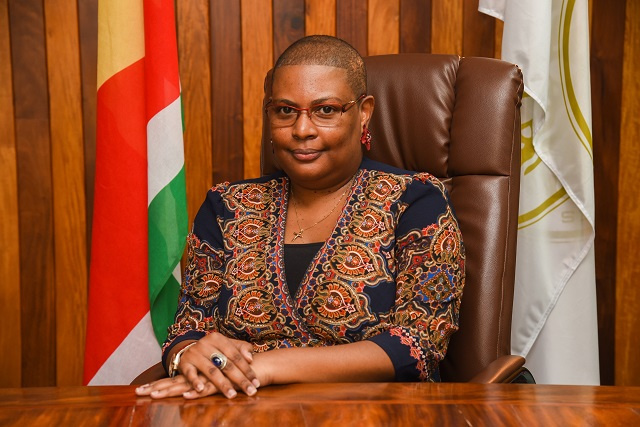- Details
- East Africa
- 706
Caroline Abel has been re-appointed as the Governor of the Central Bank. (CBS)
(Seychelles News Agency) - To coincide with International Women's Day on March 8, Seychelles' President Wavel Ramkalawan recently appointed four women professionals in prominent positions in the administration of the country.
State House said in a press communique on Friday that these are the re-appointment of the governor of the Central Bank of Seychelles, Caroline Abel, the new principal secretary for finance, Astride Tamatave, the new commissioner general of the Seychelles Revenue Commission (SRC) Varsha Singh, and the chief executive of the National Bureau of Statistics (NBS), Li Fa Cheung Kai Suet.
In conveying his sincere congratulations to the women professionals, Ramkalawan said the appointments are " a sign of the confidence that our administration has in the ability of women to participate in the development of Seychelles. I wish them all the very best in their responsibilities ahead. I have no doubt that they will deliver to the best of their abilities and make Seychelles proud as they contribute in the economic development of the country."
The governor of the Central Bank, Caroline Abel, was first appointed hovernor on March 14, 2012, becoming the first woman in Seychelles to hold the position. She was re-appointed to serve a second six-year term in March 2018.
Astride Tamatave was appointed the principal secretary for finance, effective as of March 11. She is a certified chartered accountant with an ACCA professional qualification and holds a master's degree in leadership and strategy in the social domain from the Institute of Public Administration, Ireland. She has 16 years of working experience in the private sector and the public service in the domain of accounting and finance. She previously held the position of comptroller general.
 |
| Tamatave was appointed the principal secretary for finance, effective as of March 11. (State House) Photo License: CC-BY |
Varsha Singh, a South African national, has been appointed as commissioner general of the Seychelles Revenue Commission (SRC). She has over 28 years of experience in tax, customs, transfer pricing, trade facilitation, international relations, building organisational excellence and driving sustainable development. Singh holds a master's degree in international customs law and administration from the University of Canberra, Australia, as well as a master's in business administration from the Management School of Southern Africa, South Africa.
 |
| Singh is the commissioner general of the Seychelles Revenue Commission (SRC). (State House) Photo License: CC-BY |
Li Fa Cheung Kai Suet, a Mauritian national, is the new chief executive of the National Bureau of Statistics. She served for 10 years as the chief executive of the National Statistics Agency (Statistics Mauritius). She has previously served in various key positions such as deputy director and senior economist at the International Monetary Fund (IMF).
 |
| Suet, a Mauritian national, is the new chief executive of the National Bureau of Statistics. (State House) Photo License: CC-BY |
Meanwhile, in his message for International Women's Day, Ramkalawan said, "Let us reflect on how we can continuously empower women while encouraging women to invest in themselves for the betterment of the Seychellois society, specifically for ourselves, our families and our economic well-being."
This year's theme is "Invest in Women: Accelerate Progress" and the President said, "This theme reminds us that a concerted effort is required to encourage our girls and women to challenge themselves to succeed, and at the same time, provide a conducive environment in which they can thrive while pursuing their dreams."
He added that there is also the need to drive women's inclusion in finance and business, digital technologies, peacebuilding and climate action.
"I remain confident in the abilities of our women and on this International Women's Day, wish all of them a happy and blessed day," said Ramkalawan. (Seychelles News Agency)






